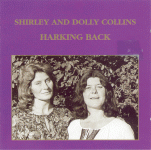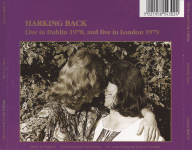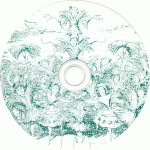Harking Back
Details
1998 CD UK Durtro DURTRO046CD
In jewel case
Track Listing
- All Things Are Quite Silent (3:28)
- Rockley Firs (2:49)
- George Collins (4:27)
- Sellenger's Round (1:25)
- Lancashire Lass (3:41)
- Poor Murdered Woman (6:24)
- The Moon Shines Bright (3:28)
- The Black Joke (2:33)
- Staines Morris (2:25)
- Come All You Streamers (3:42)
- Fare Thee Well My Dearest Dear (4:26)
- Hopping Down In Kent (5:02)
-
Morris Medley:
Wheatley Processional,
Cuckoo's Nest,
Shave The Dionkey (3:32) - The Bonny Labouring Boy (5:07)
- Greenwood Laddie (1:51)
- Just As The Tide Was A-Flowing (2:15)
- All Flowers In Broome (2:47)
- The Captain With The Whiskers (4:40)
- The Gipsy's Wedding Day (5:08)
- The Merry Milkmaids (1:19)
- Poor Sally Sits A-Weeping (1:52)
- Kate's Wedding (1:13)
Personnel
Sleeve Notes
Harking Back
Shirley & Dolly Collins Live In Concert
Dublin 1978 & London 1979
When these recordings came to light in 1998, two and a half years after Dolly's death, I listened to them with a mixture of pain and delight. They were possibly the last live performances given by my sister Dolly and me, and naturally there was a great poignancy, feeling Dolly's presence. I could see her so clearly, sitting straight-backed at the flute-organ and smiling across the keyboard at the audience and me. It was great to hear two songs that we'd never put on an album, 'The Bonny Labouring boy' which had been a song that our Grandad used to sing, and 'The Captain With The Whiskers'.
Dolly was a remarkable musician, with a fine appreciation and inderstanding of English music, and her arrangements were perfect for the English songs we both loved. I'd give Dolly a song and in a few days she'd come back with an arrangement that captured its spirit, using those lovely harmonies that were so wonderful to sing with. She made it look and sound simple, but hers was a rare talent. She was clever without being smart, and I often felt that her work and worth were undervalued.
Dolly was my big sister - we grew up during the War together. We were very close and she was always very protective of me, although sometimes she was a terrible tease. She was braver than me, could run faster and throw a rounders ball further, although I was pretty godd too! We were both in love with Laurence Olivier and could recite great chunks of Hamlet and Henry V, Wuthering Heights and Pride and Prejudice by heart. We started singing together in our mid-teens, Dolly sometimes playing the organ, or Granny's harmonium with its mouse-proof pedals, or later a cheap Czechoslovakian guitar that she bought on credit through an ad in the Daily Worker. In her early twenties she studied composition under Alan Bush at the Worker's Music Association, travelling up to London from Hastings where she lived in a double-decker bus parked in a field, complete with piano, while I spent a year in the United States collecting in the South with Alan Lomax, the American folklorist. When we eventually got together again, she started writing folksons arrangements to be played on early instruments, and we recorded The Power of the True Love Knot, Anthems in Eden, and Love, Death and the Lady. it was at this time, of course, that we discovered Noel Mander's beautiful reproduction of a 17th-century portative pipe-organ that so perfectly suited the plaintive quality of many of the songs, and which is the instrument she plays on this album. As an accompanist, she was sensitive, instinctive, and great fun to work with. She also wrote to great acclaim the arrangements for Peter Bellamy's ballad opera, The Transports.
I received many letters after her death, and there were two things that her friends mentioned most - her generosity and her laughter. She was warm-hearted and funny. She was a natural gardener and countrywoman, and certainly made the most of her time in the world. She loved to walk, as i do, and her habit of taking a thermos flask of coffee laced with brandy made her a perfect companion. Dolly always knew where to find violets, primroses and cowslips, rare orchids and star moss, wood ants' nests, kingfishers, and mushrooms and sloes in the autumn. She was a great gatherer, and her cupboards were full of jams and preserves. She always carried binoculars to gaze at birds by day and the stars at night. She knew the names of hundreds of wild flowers, and whenever we walked together in the Sussex countryside, which we did frequently in the last two years of her life, she taught me the names of two new wild flowers on each ramble. The last two I learned were 'Centaury' and 'Enchanter's Nightshade'. We had been out gathering sloes for her Christmas sloe gin the day before she died, and it had been a perfect late Summer day of golden sunshine and stubble fields, and a glimpse of Autumn in the reddening berries on the hawthorns. Early the next morning she died instantly of a heart attack.
She left two works she had completed weeks before, a song-cycle called 'The Pity of War', a setting of poems from the Great War, and a full orchestral score of The Beggar's Opera. Neither have yet been performed.
Her favourite poet, John Clare, wote some one hundred and fifty years, earlier,
"Our paths to joy are quite worn out
I shan't find them again..."
And for a long while that held true for me. But with the discovery of these concert tapes and Dolly herself shining there in every song and tune, I feel they might be found again.
Shirley Collins
Harking Back is dedicated to the memory of Dolly Collins... to our mother, Dorothy Florence Ball; to Dolly's son Buz Collins, singer and musician, his wife Sam and their coming baby; to my children, Polly and Robert Marshall, successfully working in the arts; to Polly's partner Chris, to Rob's partner Lisa, and to my darling grandson, little Joe Miller-Marshall; to my best friend Pip Barnes.
All tracks trad/arr Shirley and Dolly Collins, except: 4, 9, 13, 20 and 21-trad/arr Dolly Collins; 18-words anon, tune Shirley Collins; 22-composed by Dolly Collins. Track 17 is taken from William Ballett's Lute Book, arr Dolly Collins. All photographs 1978, except inner inlay photograph 1989, page 2 photograph 1935, and page 8 photograph 1994.
Produced by Shirley Collins and David Tibet. © Durtro 1998, under license from Shirley Collins. (p) Ourobouros 1998. KatSet. Mastered by Denis at Country Masters. David Tibet would like to thank Shirley Collins for all her help with this project and her constant friendship.
Shirley & Dolly Collins Live In Concert
Dublin 1978 & London 1979
When these recordings came to light in 1998, two and a half years after Dolly's death, I listened to them with a mixture of pain and delight. They were possibly the last live performances given by my sister Dolly and me, and naturally there was a great poignancy, feeling Dolly's presence. I could see her so clearly, sitting straight-backed at the flute-organ and smiling across the keyboard at the audience and me. It was great to hear two songs that we'd never put on an album, 'The Bonny Labouring boy' which had been a song that our Grandad used to sing, and 'The Captain With The Whiskers'.
Dolly was a remarkable musician, with a fine appreciation and inderstanding of English music, and her arrangements were perfect for the English songs we both loved. I'd give Dolly a song and in a few days she'd come back with an arrangement that captured its spirit, using those lovely harmonies that were so wonderful to sing with. She made it look and sound simple, but hers was a rare talent. She was clever without being smart, and I often felt that her work and worth were undervalued.
Dolly was my big sister - we grew up during the War together. We were very close and she was always very protective of me, although sometimes she was a terrible tease. She was braver than me, could run faster and throw a rounders ball further, although I was pretty godd too! We were both in love with Laurence Olivier and could recite great chunks of Hamlet and Henry V, Wuthering Heights and Pride and Prejudice by heart. We started singing together in our mid-teens, Dolly sometimes playing the organ, or Granny's harmonium with its mouse-proof pedals, or later a cheap Czechoslovakian guitar that she bought on credit through an ad in the Daily Worker. In her early twenties she studied composition under Alan Bush at the Worker's Music Association, travelling up to London from Hastings where she lived in a double-decker bus parked in a field, complete with piano, while I spent a year in the United States collecting in the South with Alan Lomax, the American folklorist. When we eventually got together again, she started writing folksons arrangements to be played on early instruments, and we recorded The Power of the True Love Knot, Anthems in Eden, and Love, Death and the Lady. it was at this time, of course, that we discovered Noel Mander's beautiful reproduction of a 17th-century portative pipe-organ that so perfectly suited the plaintive quality of many of the songs, and which is the instrument she plays on this album. As an accompanist, she was sensitive, instinctive, and great fun to work with. She also wrote to great acclaim the arrangements for Peter Bellamy's ballad opera, The Transports.
I received many letters after her death, and there were two things that her friends mentioned most - her generosity and her laughter. She was warm-hearted and funny. She was a natural gardener and countrywoman, and certainly made the most of her time in the world. She loved to walk, as i do, and her habit of taking a thermos flask of coffee laced with brandy made her a perfect companion. Dolly always knew where to find violets, primroses and cowslips, rare orchids and star moss, wood ants' nests, kingfishers, and mushrooms and sloes in the autumn. She was a great gatherer, and her cupboards were full of jams and preserves. She always carried binoculars to gaze at birds by day and the stars at night. She knew the names of hundreds of wild flowers, and whenever we walked together in the Sussex countryside, which we did frequently in the last two years of her life, she taught me the names of two new wild flowers on each ramble. The last two I learned were 'Centaury' and 'Enchanter's Nightshade'. We had been out gathering sloes for her Christmas sloe gin the day before she died, and it had been a perfect late Summer day of golden sunshine and stubble fields, and a glimpse of Autumn in the reddening berries on the hawthorns. Early the next morning she died instantly of a heart attack.
She left two works she had completed weeks before, a song-cycle called 'The Pity of War', a setting of poems from the Great War, and a full orchestral score of The Beggar's Opera. Neither have yet been performed.
Her favourite poet, John Clare, wote some one hundred and fifty years, earlier,
"Our paths to joy are quite worn out
I shan't find them again..."
And for a long while that held true for me. But with the discovery of these concert tapes and Dolly herself shining there in every song and tune, I feel they might be found again.
Shirley Collins
Harking Back is dedicated to the memory of Dolly Collins... to our mother, Dorothy Florence Ball; to Dolly's son Buz Collins, singer and musician, his wife Sam and their coming baby; to my children, Polly and Robert Marshall, successfully working in the arts; to Polly's partner Chris, to Rob's partner Lisa, and to my darling grandson, little Joe Miller-Marshall; to my best friend Pip Barnes.
All tracks trad/arr Shirley and Dolly Collins, except: 4, 9, 13, 20 and 21-trad/arr Dolly Collins; 18-words anon, tune Shirley Collins; 22-composed by Dolly Collins. Track 17 is taken from William Ballett's Lute Book, arr Dolly Collins. All photographs 1978, except inner inlay photograph 1989, page 2 photograph 1935, and page 8 photograph 1994.
Produced by Shirley Collins and David Tibet. © Durtro 1998, under license from Shirley Collins. (p) Ourobouros 1998. KatSet. Mastered by Denis at Country Masters. David Tibet would like to thank Shirley Collins for all her help with this project and her constant friendship.


